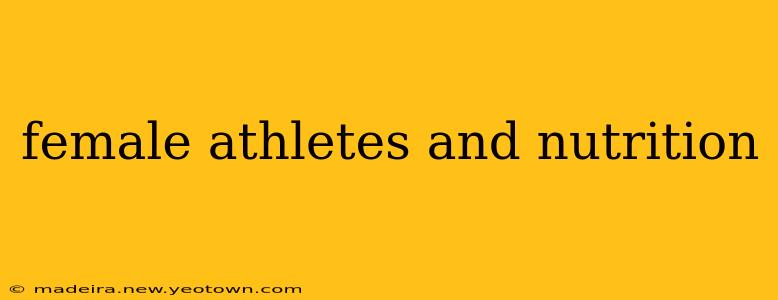The roar of the crowd, the thrill of competition, the sweat, the exertion – the life of a female athlete is a demanding one. But it's not just physical prowess that determines success; it's the unseen powerhouse fueling it all: nutrition. This isn't just about eating enough; it's about strategic fueling that supports training, recovery, and overall well-being. Let's unravel the complexities of nutrition for female athletes, exploring the unique needs and challenges women face.
My name is Sarah, and I've spent the last decade working as a registered dietitian specializing in sports nutrition, specifically for women athletes. I've witnessed firsthand the transformative power of proper nutrition on athletic performance and overall health. This article draws on my experience and the latest scientific research to provide a comprehensive guide.
What are the unique nutritional needs of female athletes?
This is a fundamental question, and the answer isn't a simple one-size-fits-all. Female athletes face a unique set of challenges compared to their male counterparts, largely due to hormonal fluctuations and differences in body composition. These differences necessitate a tailored approach to nutrition. We'll delve into these nuances throughout this article.
What are the common nutritional deficiencies among female athletes?
Iron deficiency is a prevalent concern. The consistent physical demands of training, coupled with potential menstrual blood loss, increase the risk of iron deficiency anemia. This can drastically impact performance, leading to fatigue, decreased endurance, and impaired cognitive function. Other deficiencies, such as calcium and vitamin D, are also common and can have significant implications for bone health, especially crucial for athletes engaging in high-impact activities.
How do hormonal changes affect the nutritional needs of female athletes?
The menstrual cycle plays a significant role. Hormonal shifts throughout the cycle influence energy levels, appetite, and nutrient requirements. For example, during certain phases, iron needs may be higher. Understanding these cyclical changes allows for a more nuanced and effective nutritional strategy. Furthermore, the demands of training can sometimes disrupt the menstrual cycle, leading to amenorrhea (absence of menstruation). This is a serious condition that needs immediate medical attention, as it can severely impact bone health and overall well-being.
How many calories should a female athlete consume?
There's no magic number. Caloric needs vary significantly based on factors like training intensity, body composition, sport, and individual metabolism. Under-fueling is a common problem, leading to impaired performance, hormonal imbalances, and increased risk of injury. Conversely, over-fueling can lead to weight gain and hinder performance. Working with a registered dietitian or sports nutritionist is crucial to determine an appropriate caloric intake.
What are the best foods for female athletes?
Prioritizing whole, unprocessed foods is key. This includes lean protein sources (chicken, fish, beans, lentils), complex carbohydrates (whole grains, fruits, vegetables), and healthy fats (avocado, nuts, seeds). These foods provide sustained energy, essential nutrients, and support muscle recovery. Remember, proper hydration is also critical.
How can female athletes prevent injuries through nutrition?
Adequate protein intake is crucial for muscle repair and growth, minimizing the risk of injuries. Sufficient calcium and vitamin D intake support bone health, reducing the likelihood of stress fractures. Proper hydration prevents muscle cramps and improves performance, indirectly reducing injury risk.
What are the best supplements for female athletes?
While a balanced diet should provide most essential nutrients, some athletes might benefit from supplements based on individual needs and deficiencies. Iron supplements are frequently recommended for athletes with low iron levels. However, it's crucial to consult a healthcare professional before taking any supplements, as improper supplementation can have adverse effects. A tailored approach, based on individual needs and blood work, is far more effective than a generalized approach.
This exploration into the world of female athlete nutrition only scratches the surface. The key takeaway is that a personalized approach, guided by professionals, is crucial for optimal performance, health, and well-being. Remember, fueling your body correctly isn't just about winning a race; it's about empowering yourself to live a strong, healthy, and fulfilling life.

